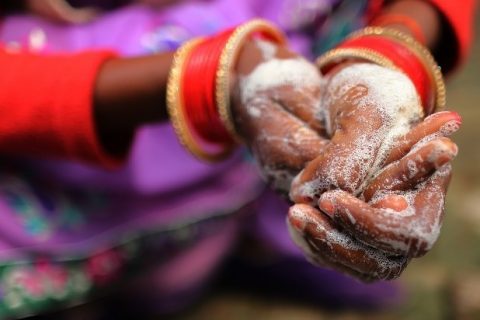Invest More To Improve hand washing For All, WaterAid Urges Governments
African News, Featured, Latest Headlines, News Across Nigeria Friday, October 15th, 2021
(AFRICAN EXAMINER) – As G20 leaders prepare to convene in Rome to improve pandemic preparedness, a frontline international not-for-profit organisation, WaterAid has harped on the need for governments, particularly in the poor countries to invest more to enable every citizens wash their hands with soap and water.
Currently working in 28 countries to change the lives of the poorest and most marginalised people, WaterAid said government investment must be made to provide hand washing for all as it plays a critical role in the fight against preventable diarrhoeal diseases and respiratory infections.
A new report by World Health Organisation (WHO) and United Nations Children’s Fund (UNICEF), released today on Global hand washing Day, reveals that giving everyone in the world’s poorest countries access to hand washing with soap and water, would cost around $11 billion. That would transform the life-chances of people who are currently unable to simply wash their hands at home.
Against this backdrop, WaterAid has estimated that just 10 days of smartphone sales would cover the $11billion cost of ensuring everyone in the poorest countries could wash their hands with soap and water at home by 2030.
Similarly, in its Mission Critical Report, WaterAid posited that trillions of dollars could be unlocked over the next two decades through universal access to water, sanitation and hygiene, adding that achieving this could generate a net benefit of $45 billion per year, and even just providing a tap in every household could yield $37 billion annually.
The not-for-profit organisation said progress is worryingly slow, noting that for everyone to be able to wash their hands at home by 2030, one of the UN’s Sustainable Development Goals (SDGs), governments need to make progress at least four times faster than they currently are.
The group stressed that investing in water, sanitation and hygiene bring multiple wins for governments, adding that it is value for money, it helps achieve health targets and it increases productivity to support economic growth.
“If governments invested in even basic water, hygiene and toilets it would bring a return on investment of up to 21 times the cost. Millions of lives could be saved and billions of dollars in untapped economic potential could be unlocked for the equivalent of just $1.40 per head of the global population”, WaterAid said in a statement to mark this year’s Global hand washing Day.
The organisation however, lamented the economic value of hand washing for all, alongside water and sanitation services, is vastly underestimated by governments, businesses, and donors, resulting in chronic under-investment.
The provision of basic water services, according to the statement, could save women and girls the equivalent of 77 million working days per year that they currently spend on fetching water, increasing their life and work options and greatly contributing towards gender equality.
“Good hygiene can reduce diarrheal and respiratory diseases at low cost, improving people’s health, reducing the costs of healthcare and freeing up people’s productive time.
“Achieving universal access to hygiene services by 2040 could prevent 96 million cases of diarrhoeal disease and 160 million respiratory infections each year. This equates to less than $10 spent to avoid each case. This could save up to $39 bn in lost productivity”, the statement added.
Country Director of WaterAid Nigeria, Evelyn Mere, said Investing in soap and water is a clear ‘no regrets’ investment, in homes, health care facilities and in schools, adding that COVID recovery and the preparedness for future pandemics cannot happen without it.
“Smart choices made by governments could play a vital role in ensuring a prosperous future, a healthier population, and a functioning society”, she said.
According to her in a previous report entitled, “Equal to the Task: Financing for a State of Emergency in Water Supply, Sanitation and Hygiene”, WaterAid analysed the financing challenges plaguing Nigeria’s WASH sector and based on research and analysis, estimates the total cost of achieving SDG6 in Nigeria to be US$2.1 billion a year in capital, operations, and maintenance.
“With current public spending, from both government and donors, at only $393 million, there is a massive annual financing gap to address. In Nigeria, a staggering 167 million people (84 percent of the population) lack basic hand washing facilities, 112 million people (56percent) do not have access to basic sanitation, and 60 million (30 percent) do not have access to basic water supply.
“At current rates of progress, SDG6, achieving universal access to safe water and sanitation – will not be met until decades after the deadline of 2030. To get progress on track, the government, businesses and donors must appreciate the value of achieving universal access to vital WASH services and expedite actions that ensure sustainable WASH for all.
“Hand washing promotion is proven to be cost-effective. Investments in health, education, and improved water supply are all jeopardised if hand washing with soap is not included in the overall plan. Governments should not wait for another crisis to hit the nation before investing wisely in the health and well-being of its people and the resilience of its economy”, she further stated.
WaterAid’s Global Campaigns Director, Claire Seaward noted that the G20 prepare to gather, it’s time governments and donors pay attention to the fact that an investment in water, sanitation and hygiene is a life-saving investment in future health and economic prosperity.
Seaward said these simple, but essential facilities have been side-lined for far too long, their value overlooked, crippling economies and trapping millions, especially women and girls – in poverty and poor health.
“Now is the time for action. Governments need to kick start behaviour change, set out clear roadmaps for achieving hand hygiene for everyone by 2030, and ring fence the financing to achieving it.
“Partnerships with businesses will be crucial to strengthening supply chains for hygiene products and services. Donors need to rapidly increase their financial support in low and middle-income countries, recognising the critical role that hand hygiene has in pandemic preparedness and addressing anti-microbial resistance”, she stressed.
Related Posts
Short URL: https://www.africanexaminer.com/?p=69239






















